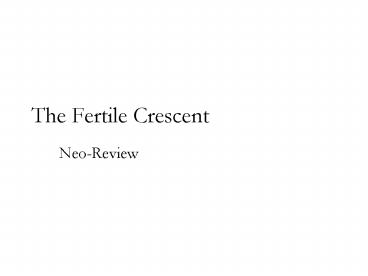The Fertile Crescent - PowerPoint PPT Presentation
1 / 18
Title:
The Fertile Crescent
Description:
Egypt Menes, Djoser, Khufu, Hatshepsut, Akhenaton, ... Rosetta Stone translation. Phoenician alphabet. SOL Content Extended Content Accelerated Content ... – PowerPoint PPT presentation
Number of Views:48
Avg rating:3.0/5.0
Title: The Fertile Crescent
1
The Fertile Crescent
- Neo-Review
2
The Fertile Crescent
3
Civilizations/Empires of the FC
- Sumerians
- Egyptians
- Akkadians
- Babylonians
- Amorites
- Hittites
- Phoenicians
- Israelites/Hebrews
- Assyrians
- Neo-Babylonians
- Chaldeans
- Persians
SOL Content Extended Content Accelerated
Content
4
Law Order Important Cities
- Sumerians Ur, Kish, Nippur (independent
city-states) - Egyptians Giza, Memphis
- Babylonians Babylon
- Hittites Hattusa
- Phoenicians Tyre, Carthage (of Africa)
- Israelites Jerusalem
- Assyrians Nineveh
- Persians Susa, Pasargad, Persepolis
SOL Content Extended Content Accelerated
Content
5
(No Transcript)
6
Law Order Kings
- Sumer Gilgamesh
- Akkad Sargon
- Babylon Hammurabi, Nebuchadnezzar
- Israel David, Solomon
- Judah Zedekiah
- Assyria Assurbanipal
- Persia Cyrus, Darius
- Egypt Menes, Djoser, Khufu, Hatshepsut,
Akhenaton, Tutankhamun, Rameses
SOL Content Extended Content Accelerated
Content
7
Law Order Rules of Behavior
- Written law codes establish rules of behavior
- Babylonians Hammurabis Code
- Eye for an eye
- Laws favor rich men
- Israelites/Hebrews Ten Commandments
- Code of ethics (love thy neighbor)
SOL Content Extended Content Accelerated
Content
8
Law Order Authority
- Centralized government
- Egypt Pharaohs (aided by viziers)
- Absolute rule Total control
- Rule of Aristocracy
- Sumer Rich counsels approve decisions
- Imperial bureaucracies
- Persia Satraps govern provinces
SOL Content Extended Content Accelerated
Content
9
Law Order Authority
- Hereditary Rule
- Power passed from father to son
- Religious influence
- Egypt Priests of Amun
- Theocracy
- God rules through chosen spiritual leader
- Israel Moses, David
SOL Content Extended Content Accelerated
Content
10
Law Order Control
- Oppressive control (Babylon)
- Widespread slavery
- Rigid class system
- Harsh legal codes
- Tolerant control (Persians)
- Rejected slavery
- Accepted other religions
SOL Content Extended Content Accelerated
Content
11
Confused?
12
Economic Patterns
- Agricultural surplus
- Tools Plow, wheel, irrigation
- Metalworking (Hittites)
- Bronze, iron tools and weapons
- Maritime trade (Phoenicia)
- Carriers of civilization
- Mediterranean trading colonies
SOL Content Extended Content Accelerated
Content
13
Cultural Innovations
- Writing Advanced record-keeping
- Sumerian cuneiform
- Egyptian hieroglyphics
- Rosetta Stone translation
- Phoenician alphabet
SOL Content Extended Content Accelerated
Content
14
Cultural Innovations
- Architecture
- Egyptian pyramids
- Sumerian ziggurats
- Temple of Solomon
- Hanging Gardens of Babylon
- Tomb of Cyrus at Pasargad
- Persian Royal Road
- Persian City (Persepolis)
- Others Darius Canal, Assurbanipals Library
SOL Content Extended Content Accelerated
Content
15
Religious Beliefs Polytheism
- Most early civilizations believed in many gods
- Gods controlled human actions, natural events
SOL Content Extended Content Accelerated
Content
16
Religious Beliefs Judaism
- Monotheistic faith of the Jews
- Abraham (patriarch) migrates to Canaan
- Moses delivers Israelites from slavery (Exodus)
- Ten Commandments (ethics)
- David unifies kingdom of Israel
- Solomon builds Temple in Jerusalem
- Babylonian Exile Nebuchadnezzar d. Zedekiah
- Diaspora (spread) of the Jews
SOL Content Extended Content Accelerated
Content
17
Religious Beliefs Judaism
- Beliefs
- Monotheism There is only one true God
- Ethics Commandments require moral conduct
- Torah Holy scripture of Jews, written in Hebrew
- Covenant God Jews have sacred agreement
- I will be your God and you will be my chosen
people. - Prophets Holy messengers interpret Gods will
SOL Content Extended Content Accelerated
Content
18
Religious Beliefs Zoroastrianism
- Monotheistic faith of the Persians
- Belief in one god, Ahura-Mazda
- Creator, all-knowing, always present
- Actions based on ethics (good, moral conduct)
- Judgment Day God will defeat evil
- All souls will be reunited with God
SOL Content Extended Content Accelerated
Content































